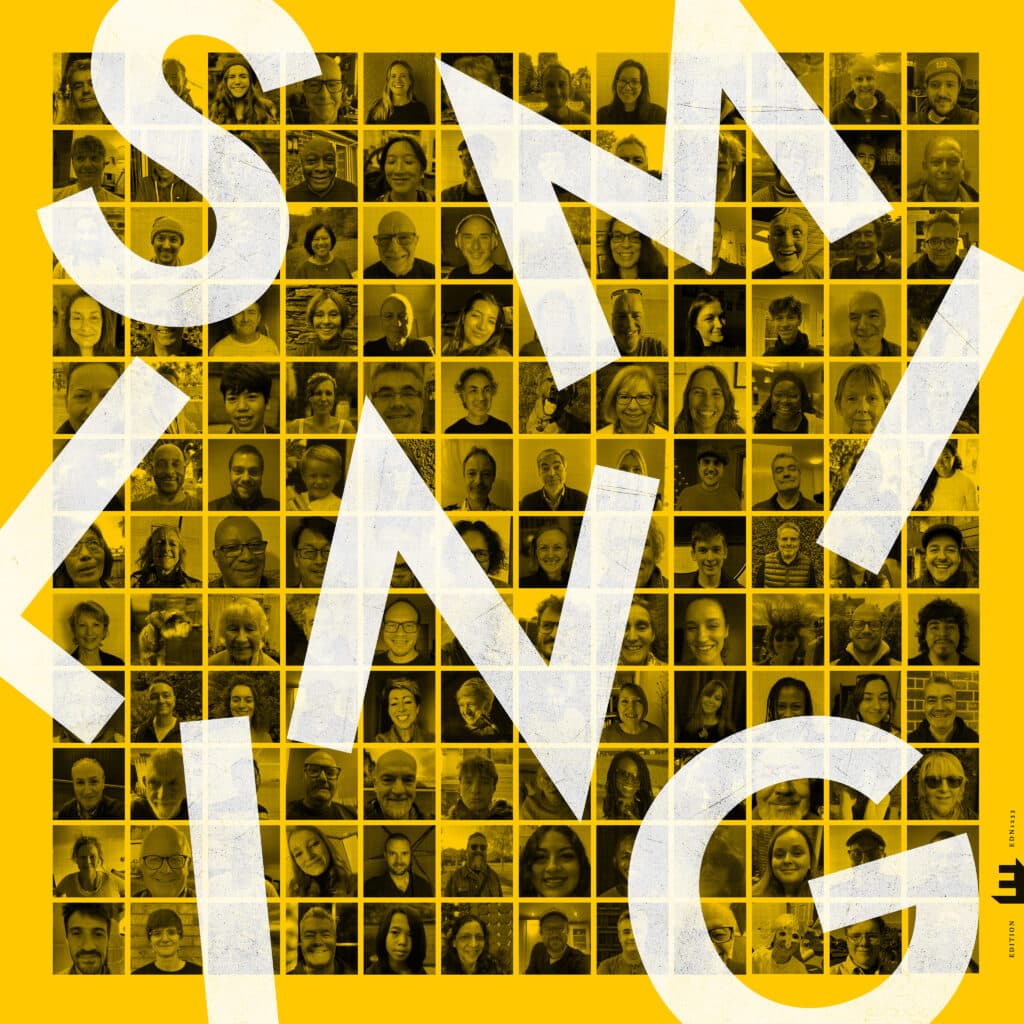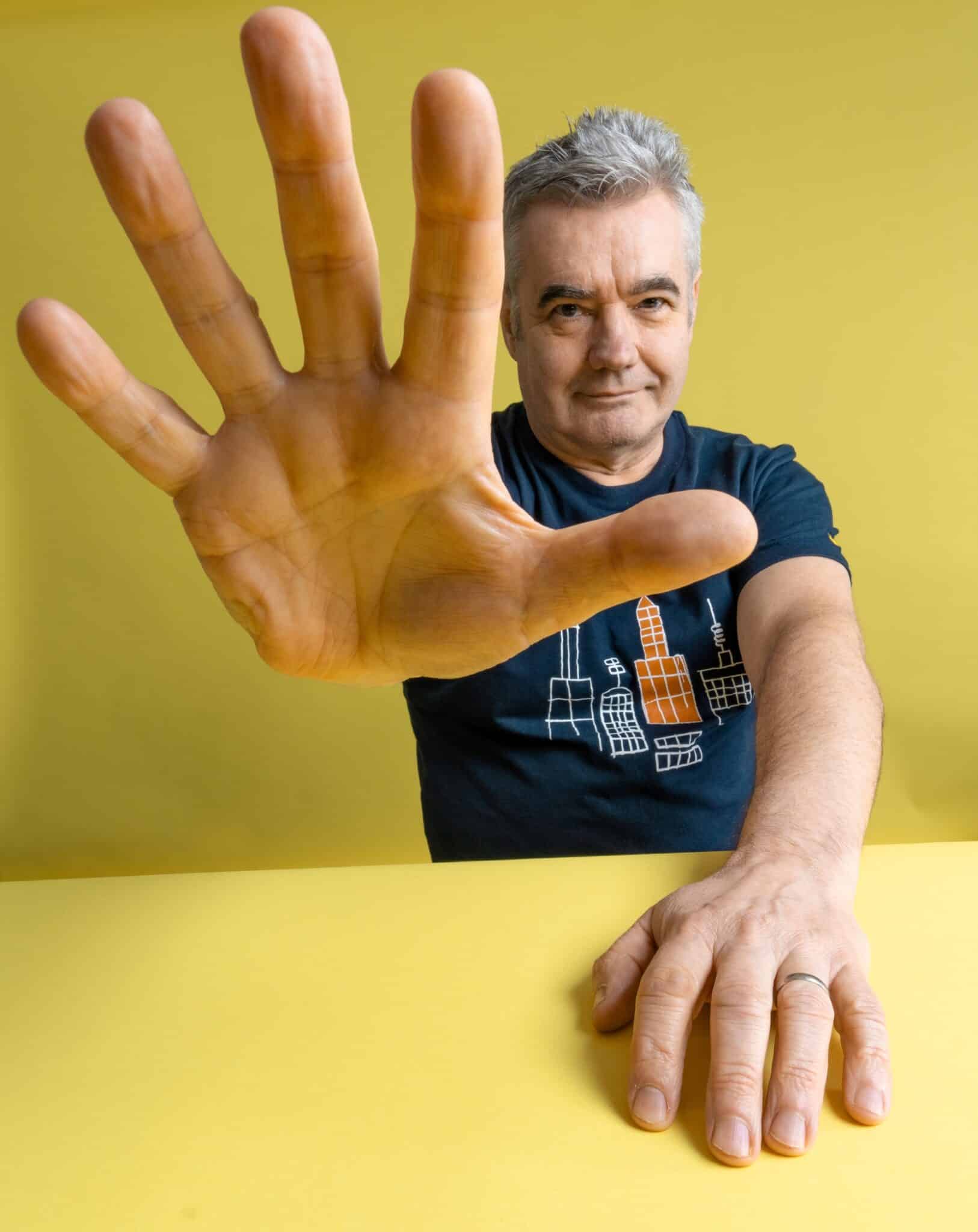Saxophonist and composer Mark Lockheart is looking for a certain kind of simplicity on his new album for Edition Records – with help from an all-star 12-piece band.
“I like that it makes me smile, this album”, says Mark Lockheart, recalling the effect when he first listened to the files preserving the fruits of two days in the studio. Well, he actually says “when I got the tapes home”, before ruefully correcting himself. It’s a sign Lockheart has been in the game a while now, but also that we have just been talking about his first recording as leader, just over 25 years ago.
That’s because there’s a pleasing continuity between his latest project, which takes its title from the composer’s reaction to that first play-through, and that earlier effort, Through Rose Coloured Glasses. For that outing, he assembled a 12-piece ensemble. It was time to stretch himself as a writer after playing others’ elaborate big band compositions in Loose Tubes in the 1980s, then getting started as a composer with the popular Perfect Houseplants. He’s told the story of that session – recording over old tape at Livingston Studios in Wood Green (link to interview below)
He’s still proud of the results. Now, after a great range of projects in between, including exciting small groups (Polar Bear, Dreamers), duos, trios, a notable re-working of Ellington tunes, the big band recording with the NDR Days Like These, and the richly ambitious Days on Earth featuring jazz sextet and a full orchestra, he goes one better with a 13-piece featuring an enviable assembly of the UK’s finest jazz players.
The continuity is there, too, in the personnel – John Parricelli on guitar, Jim Rattigan on French horn and Rowland Sutherland on flute were all on the earlier session – and the studio: the new album was made in the familiar surroundings of Livingston. “It’s a good space: I feel like it’s creative to walk in there”. And many of the other players have worked with Lockheart a fair bit too.
But the intent this time was clearly different. “I wanted to write in a simpler way. I mean, Days on Earth was quite an epic.” He opted to be spare with harmony. “There’s quite a lot of staying on one chord and seeing what I could do with it, orchestrating things around it, but very much thinking of the groove. The drums are really important on this.” That went with the choice to have guitar, rather than piano, for sparser sound – hence Parricelli – and a general leaning as a composer to allow less to be more. He muses on what has changed for him over the decades. In a word, it’s editing: “I think, when you start writing, you tend to include everything. And over the years I’ve learned to do that less and be less precious about holding on to everything. I’m getting better at discarding and just focusing on on the essence of things”.

That allows new influences to surface. The band has two French horns, and sonorities that can echo Gil Evans or Mike Gibbs. But certain rock strands are woven in as well. Lockheart is “cautious” about influences, striving for a personal sound, but still: “Steely Dan, you know, is a massive influence on my generation. And I hear some of that on the first track. I mean, it’s a lot busier than a Steely Dan album, but it’s the groove. It carries on and it develops and it’s arranged but I remember thinking in the studio I really liked this because it’s a little bit Steely Dan.”
That’s only one among many flavours that come through from this little big-band, though. The larger forces mustered allow a composer to add as much beguiling detail as you could wish for. Lockheart revels in the opportunity: “I’ve used the 13 piece instrumentation in various ways : textural, melodic and rhythmic. Orchestration has always been hugely important to me, even working with a small group. I also love having two (or sometimes three) melodic lines playing at the same time. This has always fascinated me and perhaps is more of a classical thing, although I do hear it in composers like Django Bates, Pat Metheny and Gil Evans, or Zappa.”
But there’s also the sound of one melody when all the instruments work together to savour: “Unison too is something I’m appreciating more and more as a writer. Although a simple device it’s often the most beautiful solution, especially when the instruments are in their ’sweet spot’. On Smiling unison was important especially with the saxes, which gives them boldness and edge.” And finally, “The other aspect I’m very conscious of is the sonic width of the band and I tried to have strong bottom and high frequencies – the flute and clarinets often providing the high end of the sound – Stravinsky is of course a master at this sort of thing!”
For all this to work, you need a band like this one that’s packed with great players. Lockheart enthuses about them all, starting with the oldest associates. On Parricelli: “He can be orchestral; groove; he knows about rock music; he knows about folk music; And then of course, the soloing. I’ve always loved his playing, and we’ve done a massive amount over the years. I can’t really think of anyone else who brings quite what he can bring to my music.”
And Rowland Sutherland, whose breathy flute attack is the first solo instrument you hear on the record: “Who doesn’t love his playing? He’s got his own kind of language that isn’t bebop, and I like that And he’s an incredible musician.” Add other players he’s close too such as Laura Jurd on trumpet, Dave Smith on the drums, James Allsopp on clarinets and, perhaps less expectedly, Nathaniel Facey on alto sax and it’s quite the summit meeting.
That will make touring the music unlikely – even getting all these voices into the studio is a bit of a stretch: “I mean, none of this makes sense financially.” But, buoyed by strong reactions to early tracks on social media, he seems unbothered by the fact that a brace of sets at the Vortex in April may be the only live airing of this music. “At this point in my life, I just want to get this music out there and let people hear.”
It’s a relaxed attitude that also comes across in his approach to writing and performing now he’s in his sixties: “I’ve got much better at compositional form, deciding what to leave out, and making ideas link.” That goes along with “enjoying playing much more. I like to linger. It’s a balance, but following the story slowly sometimes is lovely.”
That is certainly a quality that comes across in Lockheart’s own playing on the record. It seems to carry over into the work of the other soloists too, and accounts for much of the warmth of the album. “I’m really pleased about it, because for me it’s not about how complicated it is. It’s about the feeling and the vibe and the character of the music. That’s the important thing”. And that, perhaps will evoke more of the appropriate facial expressions when Smiling comes out at the end of March.
Smiling launches at the Vortex on April 6th (two shows)



One Response